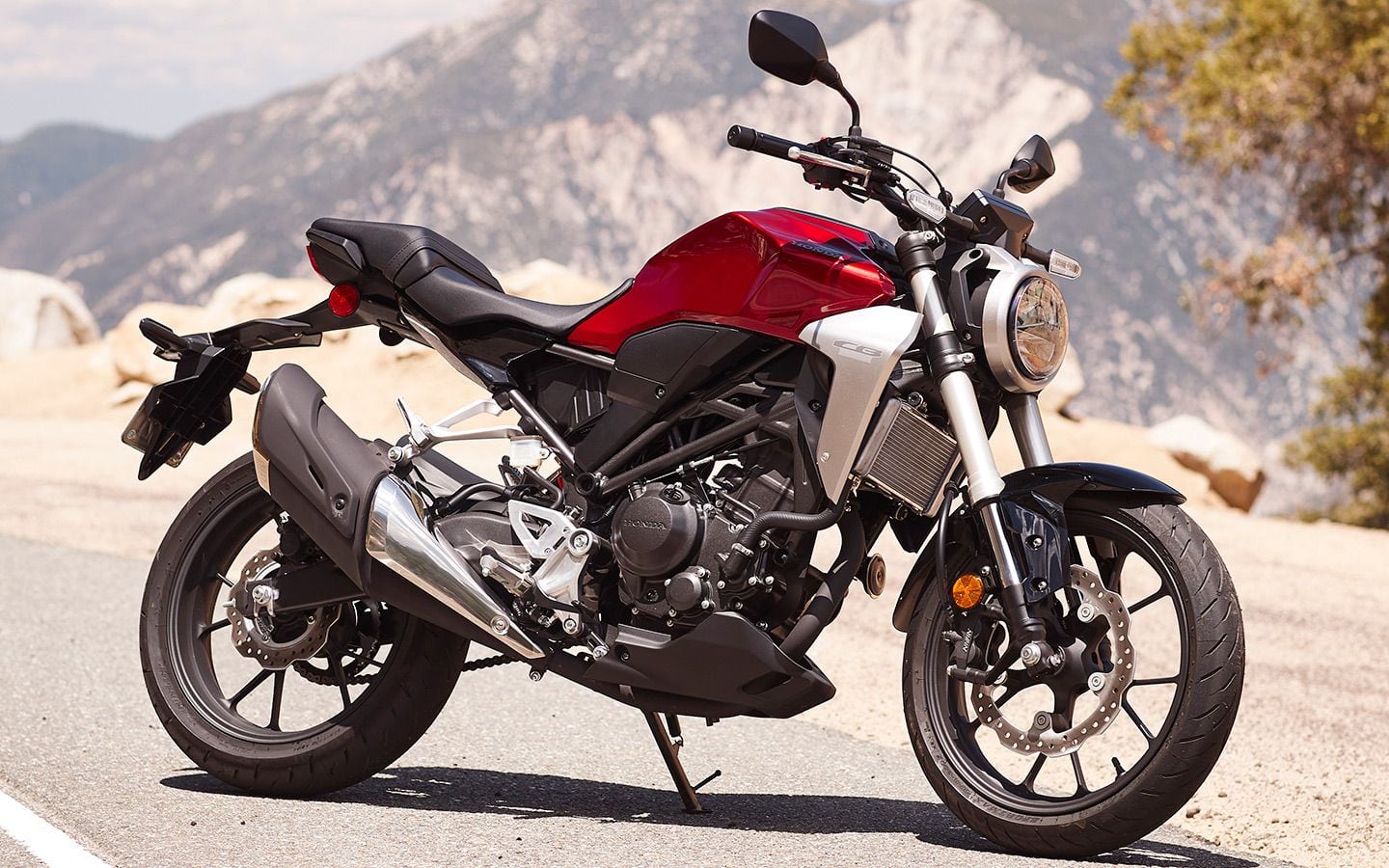If you mistook the motorcycle pictured above for Husqvarna's Vitpilen 701 or the Honda CB1000R, you could be forgiven. It looks very similar, but it's actually Honda's new-for-2019 CB300R, and at $4,695 it offers all the retro style and futuristic cool of the Vit and CB1000R but at a much more affordable price and in a smaller, more manageable package.
The CB300R replaces the CB300F in Honda's naked-bike lineup, and since I owned a 2011 CBR250 and have ridden and raced a CBR300 and just finished racking up more than 2,000 miles on a 2018 CB300F as part of an upcoming MC Garage video on engine break-in, I feel like I'm in a pretty good position to compare this new machine to the one it replaces. So, here goes…
When you really get down to it, the only time your bike might feel too light is in a stiff crosswind. At all other times, less mass is an improvement. And few times in history have we seen a motorcycle lose as much as the 2019 CB300R. This new, svelte model is said to tip in at just 313 pounds (without ABS), which is some 35 pounds and 10 percent less than the outgoing CB300F. That's going to make the bike easier to handle and manage, make it accelerate faster, brake better (perhaps—more on that in the "Fails" section), turn quicker, and overall be more responsive and fun. If Honda had shed 10 pounds I would have been impressed. But 35?! That's amazing, and definitely an impressive aspect of this bike.
Is it a café racer? Is it a modern naked? Does it matter? What does matter is that the CB300R looks cool, and that seems to be the opinion no matter what camp you associate with. The round headlight is a nod to the past yet the lighting is the latest LED technology. Those sharp, clean, simple lines look good from any angle, and the new inverted fork makes the CB300R look brawny, not scrawny like the CB300F. I like the tapered-aluminum handlebar, the tidy dash, the radiator shrouds, the wheel design, the new swingarm, and even the frame. The CB300R is really a handsome machine, and the fit and finish are exceptional for a bike at this price point.
Yup, I’m excited about the gas cap. After 2,000 miles (which is actually only about nine fill-ups) on the CB300F, I was about ready to throw the bike’s gas cap at the horizon. And I could because it comes off in your hand when you twist the key. Not having a hinge means you need to find a place to set the cap. A minor inconvenience, but one that frustrates every time you need to add gas. Thankfully, the new CB300R has a hinged cap, making that rare trip to the pump a little easier.
The CB300R’s seat may be a smidgen higher than on last year’s bike, but the wheelbase is shorter and we already know that the curb weight is way down. Any way you slice it, the CB is a small bike. But it doesn’t feel that way, at least in terms of the way your elbows, back, and knees are bent when you’re on the bike. The higher seat adds some much-needed legroom while the wider, seemingly lower bar leaves your upper body in a more relaxed position. The end result is a very comfortable, upright, and respectable riding position. The only drawback is the seat, which looks good but hurts your butt after an hour or so due to too-thin (or maybe just too hard?) seat foam.
For the record, the 286cc single that powers the CB300R and has powered the CBR/CB platforms since 2015 is an excellent means of turning gasoline into forward motion. The clutch and transmission are smooth and easy to use, the cartridge oil filter is cheap and easy to change, and you can't argue with 75 mpg. But 27 hp just isn't that exciting, and it leaves the bike feeling strained and stressed on the freeway. The new CB300R uses the same engine we're familiar with, and while the bike's lighter weight should make the little R a bit quicker, it doesn't feel that way and the same final-drive gearing means you're going to be spinning 8,000 rpm at 70 mph. It would only take a 2mm bore increase to push displacement to a full 300cc, and the extra 14cc might give the bike the bump in performance that we're all craving.
The thick inverted fork and big brake caliper are some of the first things people notice on this bike. The previous CB300F had a skinny right-side-up fork and an axial-mount two-piston setup, so the assumption is this four-piston, radial-mount caliper is going to be a beast. No such luck. The brake lever is actually spongier than the outgoing CB300F’s, and even if you clamp on it with all your strength you’re not likely to engage the ABS or bring up the back tire. It looks as though Honda is using the same size master cylinder as before, so I’m thinking it’s just not moving enough fluid to take advantage of the bigger pistons in the new caliper. The brakes work fine, but given how strong and responsive the setup was on the CB300F, the CB300R’s brakes are a move in the wrong direction and, frankly, disappointing given the expectation of more performance.
Thank you, Honda, for the LED lighting, the dope-looking fork, the lower curb weight, and the tidy all-digital dash. It's got more features than before, including current and average mpg, a coolant-temperature gauge, and an adjustable shift light. Those are useful and appreciated features. But you know what would be more useful and appreciated? A gear-position indicator. It's a feature I feel every motorcycle should have (especially bikes aimed at beginners), and it's missing from this bike's otherwise comprehensive data display.












/cloudfront-us-east-1.images.arcpublishing.com/octane/MD2XXGPSQB6T64DZ5R3IQISYMQ.jpg)
/cloudfront-us-east-1.images.arcpublishing.com/octane/VYTKXCRUMLCSCKHNIRK5ZBWL6A.jpg)
/cloudfront-us-east-1.images.arcpublishing.com/octane/4YMERWH4QBEJBSAPDQZO5NZL4E.jpg)
/cloudfront-us-east-1.images.arcpublishing.com/octane/PGCIRPWHNM23JKK5CFKW7XFXOA.jpg)
/cloudfront-us-east-1.images.arcpublishing.com/octane/QSABJGJTF356MLCA6NCMYDFMC4.jpg)
/cloudfront-us-east-1.images.arcpublishing.com/octane/GSN2AXRDZF5TM4AU3Y2G6QS6L4.jpg)
/cloudfront-us-east-1.images.arcpublishing.com/octane/FSPGHNPLSY5HO4SPWWSVLHNXZE.jpg)
/cloudfront-us-east-1.images.arcpublishing.com/octane/QCZEPHQAMRHZPLHTDJBIJVWL3M.jpg)
/cloudfront-us-east-1.images.arcpublishing.com/octane/HXOUJXQWA5HBHGRO3EMJIGFMVI.jpg)

/cloudfront-us-east-1.images.arcpublishing.com/octane/3TIWWRV4JBBOLDVGRYECVVTA7Y.jpg)
/cloudfront-us-east-1.images.arcpublishing.com/octane/KIX5O23D5NAIBGFXBN3327DKZU.jpg)
/cloudfront-us-east-1.images.arcpublishing.com/octane/7GJYDUIPXRGMTMQKN6ONYOLBOU.jpg)
/cloudfront-us-east-1.images.arcpublishing.com/octane/MUQLOVLL2ZDGFH25ILABNBXKTI.jpg)
/cloudfront-us-east-1.images.arcpublishing.com/octane/TNOU5DNE2BC57MFPMGN2EIDXAM.jpg)
/cloudfront-us-east-1.images.arcpublishing.com/octane/GTCXACQGJ5HAPDTGWUQKDEH44E.jpg)
/cloudfront-us-east-1.images.arcpublishing.com/octane/S35YGSEMEZB4BLTDJTSZPF4GLA.jpg)
/cloudfront-us-east-1.images.arcpublishing.com/octane/5UOT6HPX2JFMRJAX6EH45AR4MQ.jpg)
/cloudfront-us-east-1.images.arcpublishing.com/octane/OKWOJWAKP5EP3OACCRRWPCIX2Q.jpg)
/cloudfront-us-east-1.images.arcpublishing.com/octane/2WF3SCE3NFBQXLDNJM7KMXA45E.jpg)
/cloudfront-us-east-1.images.arcpublishing.com/octane/G4MG6OUCJNBSHIS2MVVOTPX65E.jpg)
/cloudfront-us-east-1.images.arcpublishing.com/octane/IIGGWFOTOJGB7DB6DGBXCCMTDY.jpg)
/cloudfront-us-east-1.images.arcpublishing.com/octane/QSTCM6AVEZA5JJBUXNIQ3DSOF4.jpg)
/cloudfront-us-east-1.images.arcpublishing.com/octane/U4I7G625B5DMLF2DVIJDFZVV6M.jpg)
/cloudfront-us-east-1.images.arcpublishing.com/octane/B6XD6LS6IVCQPIU6HXDJSM3FHY.jpg)
/cloudfront-us-east-1.images.arcpublishing.com/octane/ICL63FEDDRDTTMINYICCEYGMDA.jpg)
/cloudfront-us-east-1.images.arcpublishing.com/octane/FCGZHQXRBZFLBAPC5SDIQLVF4I.jpg)
/cloudfront-us-east-1.images.arcpublishing.com/octane/WNOB6LDOIFFHJKPSVIWDYUGOPM.jpg)

/cloudfront-us-east-1.images.arcpublishing.com/octane/X33NU3E525ECRHXLNUJN2FTRKI.jpg)
/cloudfront-us-east-1.images.arcpublishing.com/octane/6KKT5NNL2JAVBOXMZYS5ZO76YA.jpg)